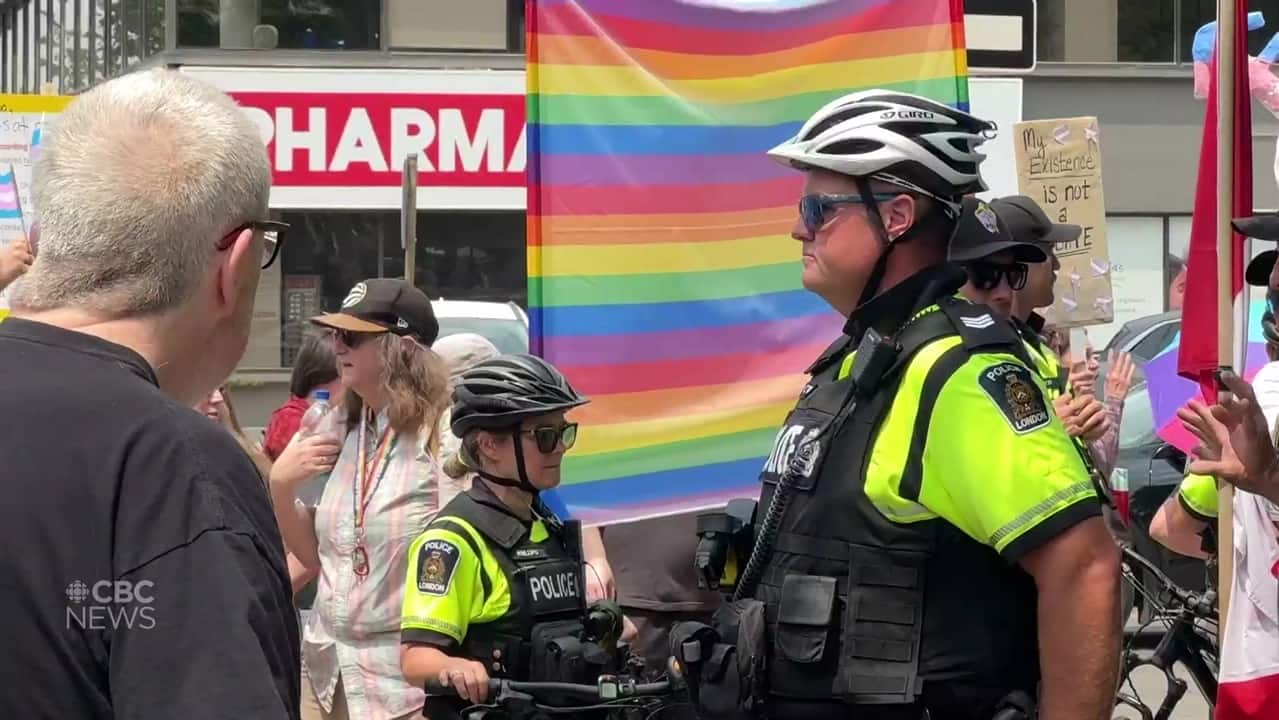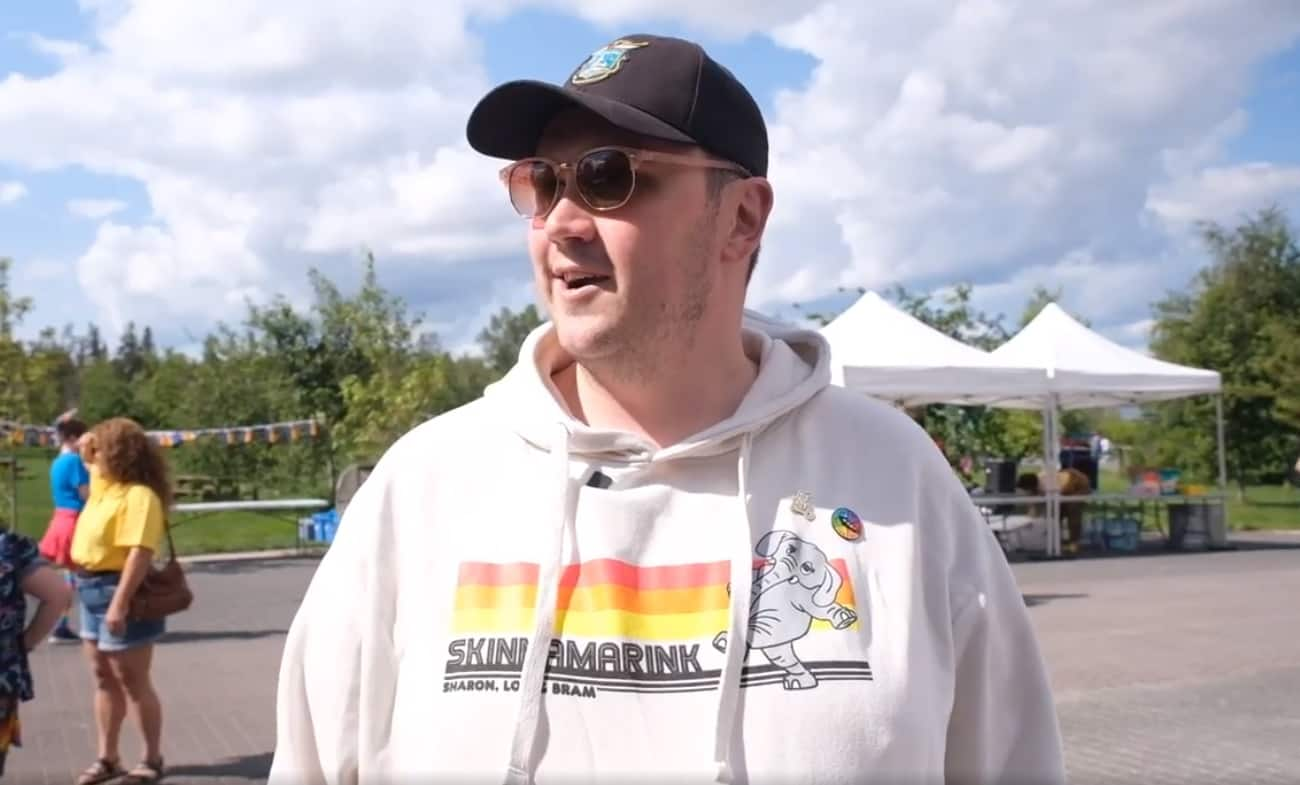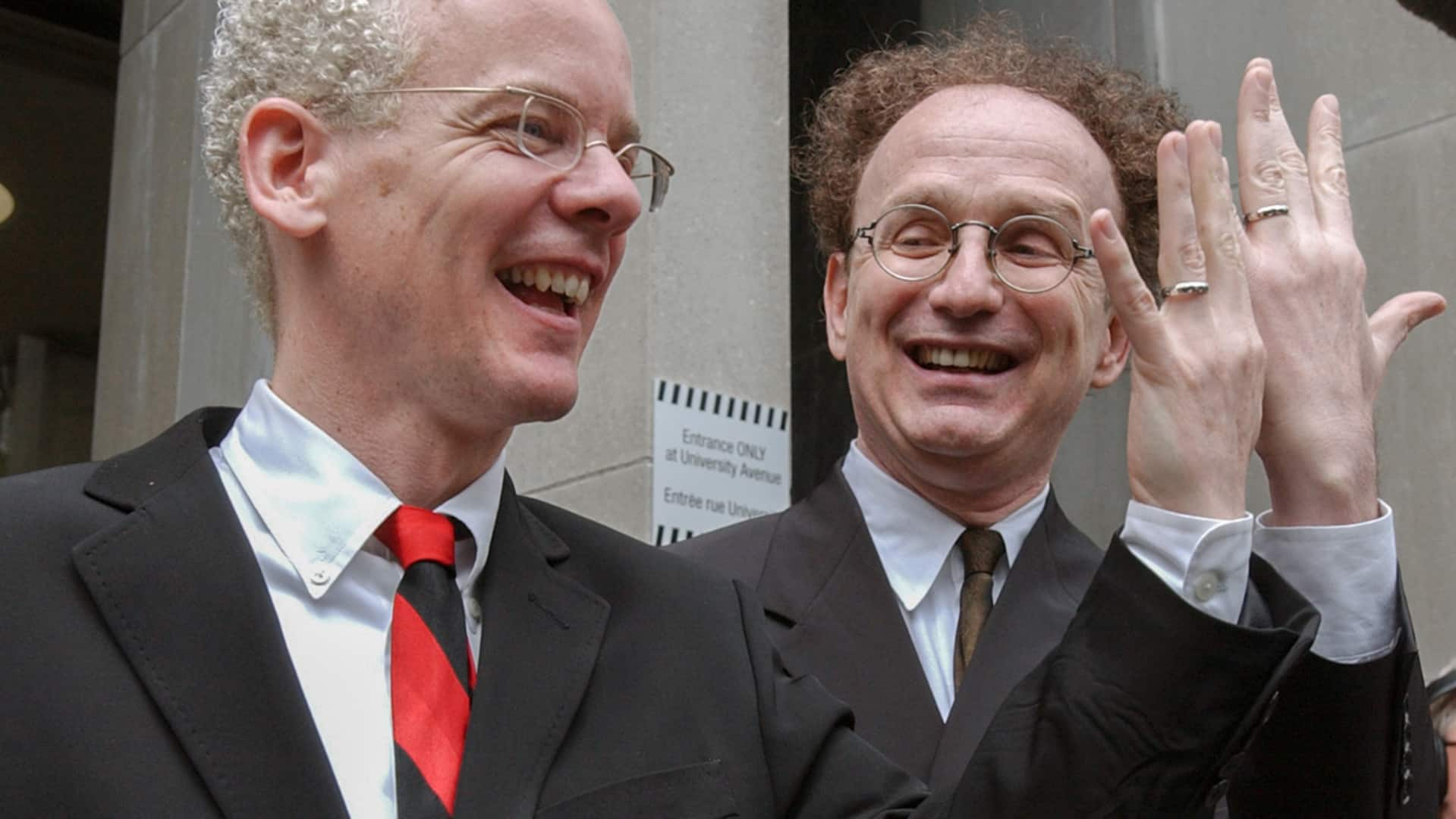Advocates say harmful rhetoric on rise, particularly targeting trans people.
Warning: This story contains references to suicide.
Longtime 2SLGBTQ activist Clare Nobbs has been celebrating Pride month in Toronto for more than three decades — but this year a rise in harmful rhetoric has left her anxious and angry.
“I’m angry because our identities are apparently up for debate. There are questions around who we are, and why we should be celebrating,” Nobbs told The Current’s Matt Galloway.
“But I reject that … I refuse to be ashamed of who I am. And so I will be celebrating,” she said.
“I’m celebrating community and I’m celebrating love.”

Scenes from the protest at Wortley Pride’s 2023 event
Protesters and counter-protesters clashed at the corner of Wortley Road and Elmwood Avenue in London on Saturday, over a drag queen storytime event that took place during the annual Pride celebration.
Across Canada, recent months have seen protests against drag queens reading to children, stand-offs round access to gender-affirming care, and public rows about Pride flags. In New Brunswick, Premier Blaine Higgs has lamented a rise in gender diversity as “trendy,” and proposed legislation that would bar teachers from using a student’s preferred pronouns without parental consent.
In the U.S., hundreds of bills focused on transgender people have been brought forward so far this year, targeting gender-affirming care, participation in sports, bathroom use and education around gender and sexuality.
Nobbs sees “a rising tide of hate,” driven by far-right religious and political figures who’ve “given permission for all kinds of hateful things to be said and done against people who are different.”
“Six months ago people said, ‘Oh, it’s mostly in the States, it’s in the south.’ It is creeping up fast,” she said.
“There have been people acting in silos, fomenting, gathering strength, and they don’t want to see our human rights respected. They don’t want to acknowledge that difference.”
For Joshua LeClair, a two-spirit Anishinaabe person and Pride organizer near Thunder Bay, pushing back against that kind of rhetoric “comes down to saving lives.”
“The consequences [are] someone’s child dying, someone’s brother or sister dying,” he said.
LeClair is 33 and grew up watching Canada and other countries debate marriage equality. He said that debate made him feel as if large parts of society didn’t think he deserved the right to start a happy family of his own.
“At 15, in adolescence and you’re hearing that — why stay?” he said.
In grade 12, LeClair attempted suicide, but survived.
“I’m so glad I failed because there might be somebody questioning right now because the violence and vitriol is present in all of our cities,” he said.
“It really makes me angry. I know I have a voice, and I will go speak up for those people who may be experiencing their voice being taken away.”

Trans people targeted
Advocate Fae Johnstone said that Pride should be an opportunity for 2SLGBTQ communities to come together, celebrating progress and acknowledging the work left to do.
“[But] I’m scared this season and I think a lot of folks are too … I’m waiting everyday for a headline of somebody being assaulted,” said Johnstone, a trans woman, president of advocacy group Queer Momentum and executive director of consulting firm Wisdom2Action.
“It comes at a price for our mental health, both for those of us doing this work in advocacy, but for every gay or trans kid who’s seeing those headlines too,” she said.
Pride festivals across Canada have expressed fears over safety at events this year, prompting the federal government to pledge $1.5 million in emergency funding earlier this month, to ensure Pride festivals remain safe across Canada.

‘Incredibly heartening and important’: Yellowknife holds its 1st Pride parade
Yellowknife held its first Pride parade Sunday. “As a young, formerly-closeted gay kid who grew up here and saw what it was like in the ’90s, to see where it’s kind of evolved from, it’s incredibly heartening and important,” says Yellowknife City Councillor Garett Cochrane. The CBC’s Graham Shishkov was there.
Johnstone said she received death threats earlier this year after being featured in a Hershey’s ad campaign for International Women’s Day.
She thinks trans people are “being used as tropes to fuel a broader regression on gender and sexual rights writ large.”
“It’s part of this growing far-right movement that is jumping from issue to issue to issue to create these wedges,” she said.
“Now they’ve got trans people in the limelight and they’re hoping that … [by] rolling back inclusion for us, that opens the opportunity to do this for so many other communities.”
Historical echoes in language
For Nobbs, some of the language being used to attack trans communities today reminds her of language used to argue against gay and lesbian equality decades ago.
“It reminds me of before our human rights were recognized,” she said, adding that words like “grooming” or “recruiting” try to paint 2SLGBTQ communities as “sexual predators.”
“I was raised by straight parents and I’m queer — they didn’t recruit me,” she said. “Both my kids are hopelessly heterosexual.”
About That | 20 years after Canada’s first gay marriage, are LGBTQ rights at risk?:

20 years after the first same-sex marriage in Canada, are LGBTQ rights at risk? | About That
Twenty years ago, Michael Leshner and Michael Stark made history in Canada, as the country’s first legally married same-sex couple. Andrew Chang looks back at the work it took to get there, and the challenges that lie ahead for LGBTQ rights.
Johnstone said that language is intended to encourage shame among 2SLGBTQ individuals, but also about mobilizing violence.
“It creates a context where your everyday homophobe or transphobe is more likely to throw slurs at queer or trans people when we’re walking to the grocery store,” she said.
“It creates a context where they’re emboldened to engage in acts of violence.”
‘A well-oiled hate machine’
Johnstone said there’s a lot to be proud of in Canada, and the current climate should not take away from efforts by older generations to secure rights for 2SLGBTQ communities.
“But that progress is precarious. It is not a guarantee and we cannot rest on our laurels as a country,” she told Galloway.
She worries that governments, as well as straight and cisgender people more broadly, “aren’t taking this hate seriously.”
“[I worry that] that they think it’s going to go away, or that it’s just us complaining about people expressing their opinions,” she said.
“But it is a well-oiled hate machine that will cost lives for trans and queer people.”
If you or someone you know is struggling, here’s where to get help:
- Talk Suicide Canada: 1-833-456-4566 (phone) | 45645 (text between 4 p.m. and midnight ET).
- Kids Help Phone: 1-800-668-6868 (phone), live chat counselling on the website.
- Canadian Association for Suicide Prevention: Find a 24-hour crisis centre.
This guide from the Centre for Addiction and Mental Health outlines how to talk about suicide with someone you’re worried about.
Audio produced by Ines Colabrese.
*****
Credit belongs to : www.cbc.ca
 Atin Ito First Filipino Community Newspaper in Ontario
Atin Ito First Filipino Community Newspaper in Ontario






